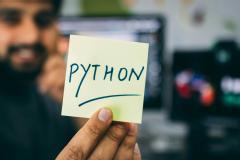In this Part-1 of Mastering Python, you will embark on an in-depth journey into the core concepts of Python programming, focusing on functional programming techniques. This course is designed to provide a strong foundation in Python by covering the following key topics:
-
Variables and Memory References:
Understand that variables in Python are simply symbols pointing to objects in memory, and how this impacts the way you manage data. -
Namespaces and Scopes:
Explore how Python handles variable scope and namespaces, crucial for understanding variable visibility and lifetime. -
Python's Numeric Types:
Dive into Python’s rich set of numeric types, including integers, floats, and complex numbers, and their behavior in different contexts. -
Python Boolean Type:
Uncover the intricacies of Python’s boolean type and learn why there’s more to a simpleorstatement than meets the eye. -
Run-Time vs Compile-Time:
Delve into the differences between run-time and compile-time, and how these concepts affect function defaults, decorators, module imports, and more. -
Functions and Lambdas:
Gain a comprehensive understanding of Python functions, including lambda expressions, and how to leverage them for concise and powerful coding. -
Functional Programming Techniques:
Master functional programming techniques in Python, such asmap,reduce,filter, andzip, to write clean, efficient, and expressive code. -
Closures:
Learn about closures, how they work, and their significance in creating flexible and reusable code. -
Decorators:
Explore the world of decorators, powerful tools for modifying the behavior of functions and methods in a clean, readable manner. -
Imports, Modules, and Packages:
Understand how to organize and structure your Python projects using modules and packages, and how to effectively manage imports. -
Tuples as Data Structures:
Discover the power of tuples as immutable data structures in Python, and when and how to use them effectively. -
Named Tuples:
Go beyond regular tuples with named tuples, a readable and convenient way to handle structured data in Python.





